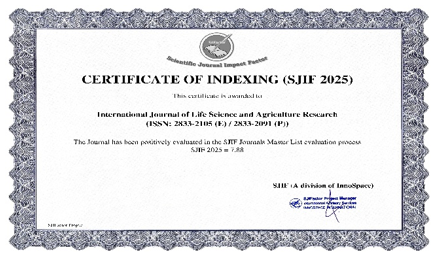Effect of Biochar on Tomato Productivity and Soil chemical Properties under Acidic Soil Condition
DOI:
https://doi.org/10.55677/ijlsar/V03I1Y2024-04Abstract
Biochar is being evaluated globally as a means to improve soil fertility, ecosystem services and sequester carbon. This study presents an attempt to analysing the influence of biochar application on the soil properties, growth, yield of tomato plant under acid soil. The study was conducted at Sher-e-Bangla Agricultural University during Robi season 2022 with 2 factor Randomized Completely Block Design. Factor A was the different acid soils with pH 6.5, 5.5, 5.0 and 4.5 and Factor B was the control, biocar and biochar+compost. The results showed that soil pH, bulk density, water content and soil organic matter were improved significantly as biochar and biochar + compost application. Biochar application also enhanced plant height, leaf number and yield components of tomato plant. It also revealed that combined application of biochar and compost increased the uptake and available of N, P, K than biochar alone and control in different level of acid soils. It was found that biochar + compost treatment in the whole growing period was best to improve tomato plant growth and yield, providing a biochar amendment recommendation for tomato production in field. Moreover, biochar application improved the soil physical and chemical properties. Therefore, biochar amendment could be an effective option to improve acidity affected croplands.
References
Atkinson, C.J., Fitzgerald, J.D. and Hipps, N.A. (2010). Potential mechanisms for achieving agricultural benefits from biochar application to temperate soils: a review. Plant and Soil, 337, 1– 18.
Bagreev, A., T. Bandosz, and D. Locke. (2001). Pore structure and surface chemistry of adsorbents obtained by pyrolysis of sewage-derived fertilizer. Carbon, 39,1971–79.
Chan, K.Y., Van Zwieten, L., Meszaros, I., Downie, A. and Joseph, S. (2008). Using poultry litter biochars as soil amendments. Australian J. of Soil Res., 46, 437 – 444.
Glaser, B., Lehmann, J. and Zech, W.(2001). Ameliorating physical and chemical properties of highly weathered soils in the tropics with charcoal – a review. Biol Fertil Soils, 35, 219–230.
Hammond, J., Shackley, S., Prendergast-Miller, M., Cook, J., Buckingham, S. and Pappa,V.A. (2013). Biochar field testing in the UK: Outcomes and implications for Use. Carbon Manag., 4, 159-170.
Hansen, A., Makiko Sato, Paul Hearty, Reto Ruedy, Maxwell Kelley, Valerie Masson-Delmotte, Gary Russell, George Tselioudis, Junji Cao, Eric Rignot, Isabella Velicogna, Blair Tormey, Bailey Donovan, Evgeniya Kandiano, Karina von Schuckmann, Pushker Kharecha, Allegra N. Legrande, Michael Bauer, and Kwok-Wai Lo (2016). Ice melt, sea level rise and superstorms: evidence from paleoclimate data, climate modeling, and modern observations that 2 °C global warming could be dangerous, 16(6), 3761–3812.
Laird, D., Pierce F., Baiqun W., Robert H., Dougus C. 2010. Geoderma. Biochar impact on nutrient leaching from a Midwestern agricultural soil, 158 ( 3–4), 436-442.
Lehmann, J. and Joseph, S. (2009). Biochar for environmental management: An introduction. In:Biochar for Environmental Management: Science and Technology, (eds.) Lehmann J. and Joseph S., Earthscan, London, 1-12.
Novak JM, Lima I, Xing B, Gaskin JW, Steiner C, Das KC, Ahmedna M, Rehrah D, Watts DW, Busscher WJ, Schomberg H. (2009). Characterization of designer biochar produced at different temperatures and their effects on a loamy sand. Annals Environ Sci. 2:195-206.
Rondon, M.A., Lehmann, J., Ramirez, J. and Hurtado, M. (2007). Biological nitrogen fixation by common beans (Phaseolus vulgaris L.) increases with biochar additions. Biology and Fertility of Soil, 43, 699 – 708.
Saqib Saleem Akhtar, Guitong Li, Mathias N. Andersen, Fulai Liu. (2014). Biochar enhances yield and quality of tomato under reduced irrigation. Agril.l Water Manage.138, 37-44.
Sohi, S.P., Krull, Lopez-Capel E. and Bol, R. ( 2010). A Review of Biochar and Its Use and Function in Soil. Advances in Agronomy,105, 47-82.
Yamato, M., Okimori, Y., Wibowo, I.F., Anshori, S. and Ogawa, M. (2006). Effects of the Application of Charred Bark of Acacia mangium on the Yield of Maize, Cowpea and Peanut, and Soil Chemical Properties in South Sumatra, Indonesia. Soil Science and Plant Nutrition, 52, 489-495.












